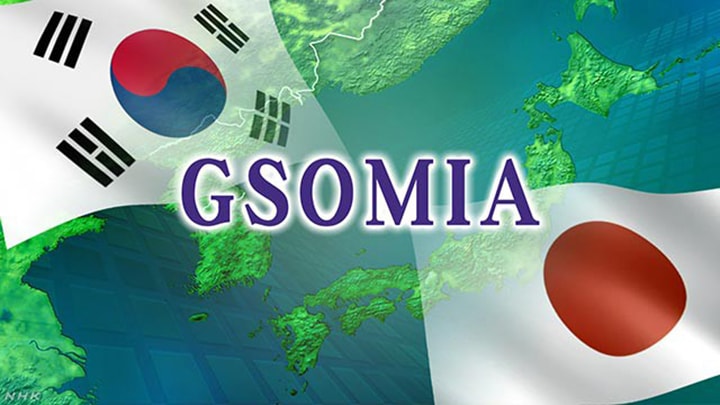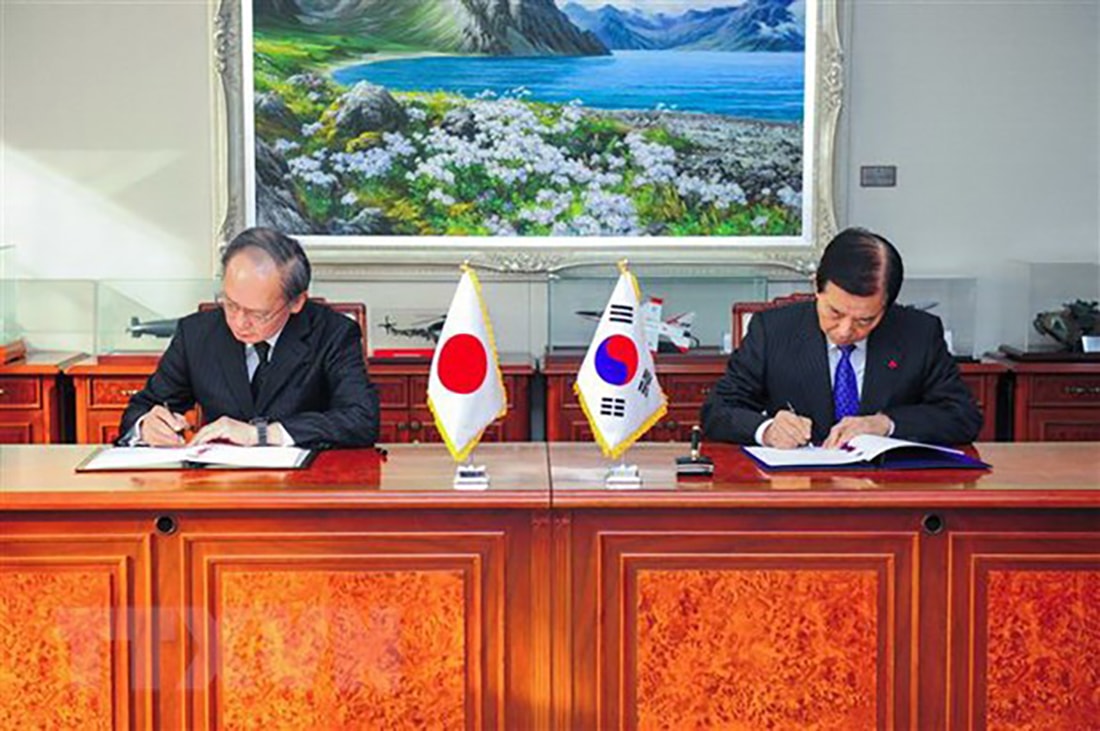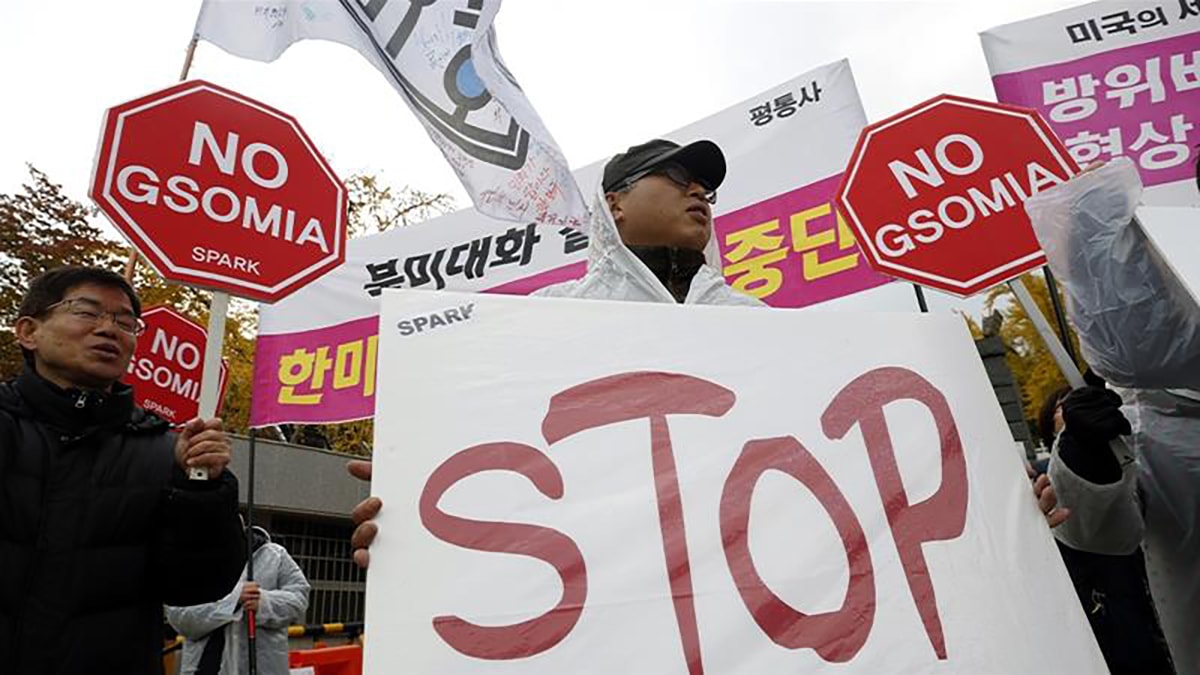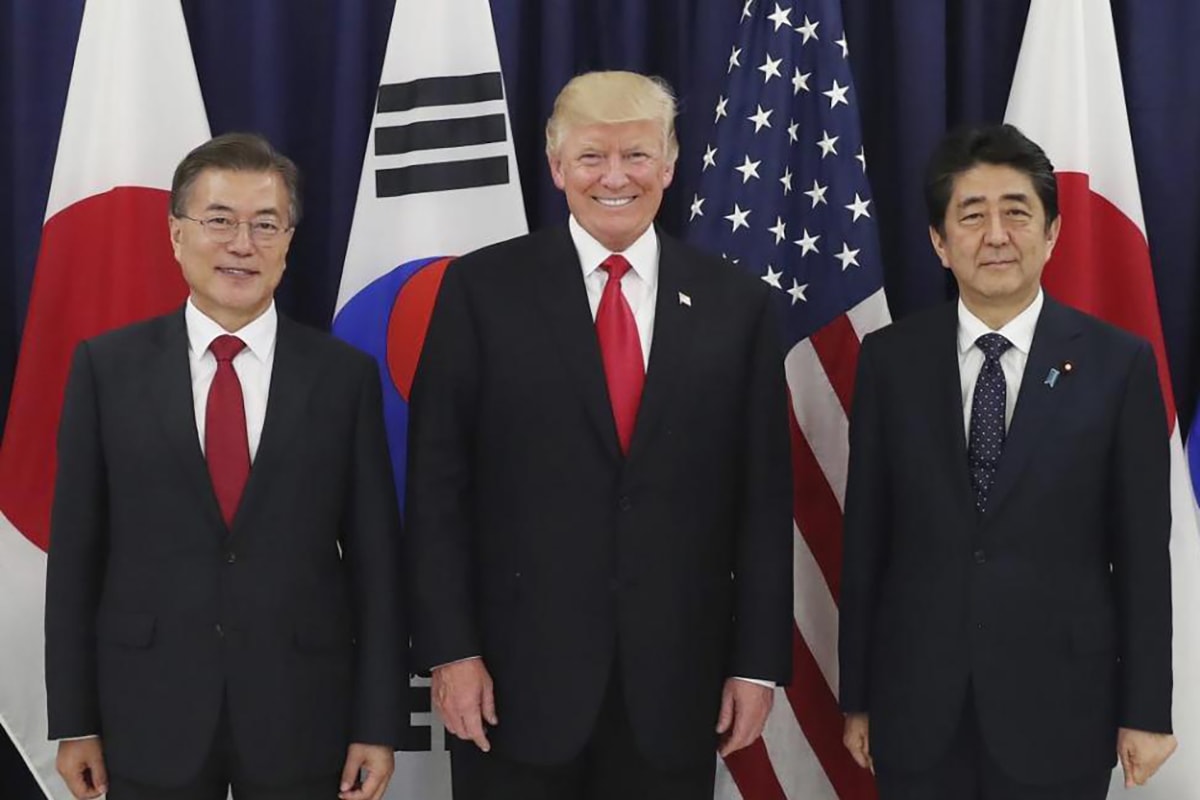Japan-Korea disagreement temporarily cools down!
(Baonghean) - Last week, public opinion witnessed unexpected ups and downs in the relationship between the two allies Japan and South Korea, related to the General Security of Military Information Agreement (GSOMIA) between the two sides to respond to the common threat of North Korea's missile tests.
Before the Agreement expired - November 23, many opinions firmly affirmed that Korea would terminate and not renew this agreement due to the deep trade confrontations between the two countries in recent times. However, at the last minute, Korea made a surprising decision to agree to renew the Agreement, causing the Japan - Korea alliance relationship to temporarily escape the risk of collapse!
 |
| On November 22, South Korea decided to extend the General Security of Military Information Agreement (GSOMIA) with Japan. Photo: Teller Report |
Military or economic?
In fact, the possibility of South Korea not renewing the General Security of Military Information Agreement (GSOMIA) was raised in August this year. At that time, the country threatened to terminate the Agreement in response to Japan's decision to restrict exports of high-tech materials to South Korea due to historical disputes, and at the same time remove Seoul from the list of trusted trade partners.
Specifically, the Japan-Korea relationship has deteriorated rapidly since the South Korean Supreme Court ruled that Japanese companies must compensate Korean forced laborers during World War II. Tensions continued to rise when South Korea later announced plans to remove Japan from its list of countries enjoying trade privileges. In September, Seoul also filed a complaint with the World Trade Organization (WTO) about a trade dispute with Tokyo over export restrictions.
 |
| South Korean Defense Minister Han Min-Koo (right) and Japanese Ambassador to South Korea Yasumasa Nagamine at the signing ceremony of the General Security of Military Information Agreement (GSOMIA) in Seoul on November 23, 2016 (File photo provided by the South Korean Ministry of Defense). Photo: AFP/TTXVN |
It should be recalled that Japan and South Korea signed the GSOMIA Agreement on November 23, 2016, with the main purpose of responding to the nuclear and missile tests of the DPRK.
The agreement is important because it helps overcome the weaknesses of the two countries in dealing with Pyongyang's missile launches. It also allows the two countries to share sensitive military information instead of going through their common ally, the United States. The agreement is automatically renewed every year, but either side can stop or withdraw from the agreement with just prior notice. Despite Prime Minister Shinzo Abe's government's assertion that the GSOMIA and the trade disputes are completely separate and should not be combined for negotiations or have mutual impacts and consequences, the Seoul government has repeatedly urged Tokyo to first remove the trade measures imposed on South Korea if it wants to renew the agreement.
On the Japanese side, it is clear that the disruption of the GSOMIA Agreement will cause difficulties and risks in monitoring North Korea's missile launches. Moreover, if South Korea really withdraws from the agreement, the relationship between the Japan-US-South Korea alliance will "fall into free fall". This also means that important security structures and axes in the region will change in a direction unfavorable to Tokyo. Of course, for its part, missile threats from the DPRK are always a constant concern for South Korea. However, creating an advantage with voters is a bigger priority that President Moon Jae-in is aiming for before the election in April next year. Because according to a recent public opinion poll, the South Korean people strongly support the termination of the GSOMIA agreement with Japan, in the context of rapidly deteriorating bilateral relations.
 |
| South Korean protesters protest against the extension of the GSOMIA Agreement with Japan. Photo: EPA |
Pressure from the US
It seemed that the November 23 deadline had put an end to the General Security of Military Information Agreement (GSOMIA) between the two allies, Japan and South Korea. But surprisingly, at the last minute, the Moon Jae-in administration agreed to extend the agreement, of course with conditions attached. Surprisingly, in the past few months, efforts by both Japan and the US to persuade South Korea to extend GSOMIA have been ineffective. These include the meeting between the Japanese and South Korean defense ministers at the expanded ASEAN Defense Meeting in Bangkok, Thailand, as well as the three-way meeting with the participation of US Defense Secretary Mark Esper. Mr. Esper's previous visit to South Korea also showed no signs of improvement.
Failing to convince, the US will certainly not be able to let the US-Japan-South Korea alliance decline, affecting its Indo-Pacific strategy.
Looking back, on November 19, the US abandoned the latest round of negotiations on military cost sharing with South Korea. Not only that, the US also asked its ally South Korea to significantly increase the costs of maintaining the forces of 28,500 US soldiers here. According to information, the US has asked South Korea to pay nearly 5 billion USD next year to cover the costs related to joint exercises as well as maintaining the activities of a large number of soldiers here. Under this huge pressure, perhaps South Korea has no other choice but to "nod" to Japan to extend the GSOMIA Agreement.
 |
| The US-Japan-Korea axis remains the focus of foreign and security policies of all three countries. Photo: Yonhap, EPA |
According to observers, the recent situation, at first glance, seems to be a "last resort" for South Korean President Moon Jae-in when he has to agree with Japan under pressure from the US. However, in reality, few people think that Mr. Moon Jae-in has certain advantages. Because the GSOMIA Agreement is still very necessary not only for Japan but also for South Korea, in the context of North Korea's continuous missile tests in recent times. Moreover, the US-Japan-South Korea relationship axis undeniably still plays an important role in Seoul's foreign and security policy. In the eyes of voters, Mr. Moon Jae-in simply had to extend the Agreement under pressure from the US in exchange for sharing defense costs!
Up to now, the relationship between the two sides has also become brighter, when the Foreign Ministers of the two countries on the sidelines of the recent G20 Foreign Ministers' Meeting agreed to make efforts to organize a summit between the two leaders next month. Of course, the long-term future of the GSOMIA Agreement cannot be predicted! Because in its statement, South Korea still affirmed that it could terminate the agreement at any time - if the negotiation on export management measures for high-tech materials with Japan fails. On the contrary, the Tokyo government still wants to maintain these measures to pressure Seoul to change the Court's ruling on the issue of forced labor. Therefore, South Korea's recent decision can be temporarily considered as "untying the knot" for Japan-Korea tensions. But this does not mean that conflicts and disagreements will not flare up at any time!

